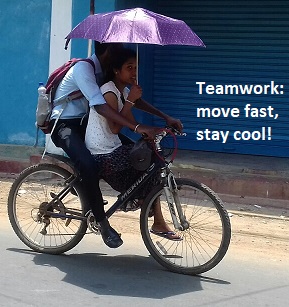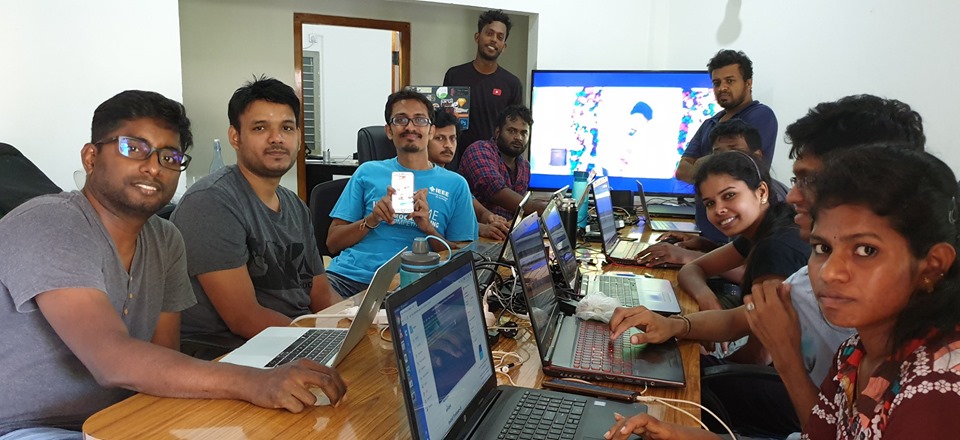By Jekhan Aruliah
“That which doesn’t kill you makes you stronger”, a much used saying originating from the 19th Century German philosopher Friedrich Nietzsche. While perhaps over-dramatic and often not true, this does apply to the Yarl Geek Challenge (YGC). YGC is a competition I have observed and in a small way supported over the last few years. A competition in which young people from around Sri Lanka form teams to develop a technological product or service. It is organised by the Yarl IT Hub, a Worldwide group of technology professionals with roots in Sri Lanka whose stated aim is “To make Jaffna the next Silicon Valley”. YGC welcomes competitors from the whole of Sri Lanka. It has the first of its two phases in Jaffna with the Final in Colombo. The first YGC was in 2012, and this year 2019 will be its eighth season.

While the YGC competitors race for the prize, I believe the real prize is participating in the competition. At each stage the YGC competitors benefit from mentoring and support. They work hard to make it to the Final where they will be exposed to the fiery furnace of potential investors. Investors who themselves have the experience of both losing and making real money in the tech industry. The mentoring and support in Phase1 is loving like a parent helping a child do the best they can. The judgements in the Finals of Phase2 are stern, more like the “real world”. Both are invaluable experiences.
The Prize in the Final is not the only prize. The competitors win prizes in the form of lessons and experiences throughout the competition. They learn the value of hard work, and the disasters that come from lazy sloppiness. They learn to challenge themselves to check they are going in the right direction, and change direction if they need to. Because they know if they don’t challenge themselves the judges in both Phase 1 and Phase 2 will challenge them and knock them over. They learn that teams only succeed if they are collectively and individually committed and they keep their commitments. We live in a country that is inured to lateness and unreliability and mediocrity to such an extent that few complain about it and fewer take the complaints seriously. The YGC teams learn that lateness, unreliability and mediocrity are the road to nowhere.
Maybe in your workplace there is some discipline, but how often have you been to a public meeting that started on time? How often have you sat in the auditorium as the organiser casually waits half an hour for stragglers, wasting the time of those who turned up promptly and teaching them next time not to bother being so prompt. Teaching them also to become stragglers! In the YGC they learn by not doing what they promise their team and their product will suffer. And they will be punished for it in the Competition. What doesn’t kill you makes you stronger!
One of the most valuable prizes in the YGC is getting to know who could be a good colleague for the future. Who is committed, focussed, reliable, and whose other talents complement your own. Perhaps most importantly, who has a good attitude and can listen, learn, teach, respect, and keep positive when things get tough.

Every now and then a company emerges from a team that bonded in the YGC. Perhaps they don’t continue with the product they created for the competition. One successful company I met tried to continue with their YGC competition product and was almost killed by it. They lost a significant amount of money in the process. But it didn’t kill them. They learned from the experience and they are now stronger for it. They have attracted investors, and are busy building other tech products and services and partnerships. I will write about them another time.
This article is about the winners of the first Yarl Geek Challenge in 2012, Team Arima. Arima is a great example of how a team successfully bonded at the YGC. I asked Arima’s CEO Jaykrishnan Rajagopalsarma where the name “Arima” came from. He said the team at the YGC was so focused on developing their product for the competition they had forgotten to name themselves. So in the hour before the competition kicked off they did a desperate brainstorm to find a name that was dynamic and would not offend anyone. Hence the electrifying and inoffensive “Arima”.
In its first incarnation competing at the 2012 YGC, Arima was made up of students from Jaffna studying engineering at Moratuwa University. I myself already knew Moratuwa University from my time running a software development operation in Colombo back in the 1990s. The high calibre of staff we recruited from Moratuwa meant any graduate who applied from there went to the top of the list for recruitment interviews.
Jay commented that life at Moratuwa University was a huge contrast to Jaffna. Jaffna lacks community and individual aspiration. Jaffna has very few role models to energise young people. In contrast the people studying at Moratuwa saw an open road to top companies and careers in Colombo and overseas. At Moratuwa they knew hard work and talent would be rewarded, a belief that is lacking in the Northern Capital. Those from the North who went to Moratuwa rarely wanted to go back North said Jay. Immediately after graduation in 2013, none of the YGC Arima team went back to Jaffna, with two moving to Singapore and two to Colombo.
In 2017 Jay did decide to return to Jaffna and setup a company with the name that proved so auspicious at the YGC, Arima. He decided to take up the Yarl IT Hub challenge “To make Jaffna the next Silicon Valley”. Of the four members of the original YGC team, three returned to Jaffna with two returning from Singapore. By 2019 Arima had grown to 25 staff.
Jay’s philosophy is not to recruit potential recruits based on interviews. Instead he gives promising candidates internships. Jay doesn’t think an hour or two of talking and testing will reveal the candidate’s strengths and weaknesses in the way actual work will. He is also not mesmerised by top class degrees from top class universities. While this may show an ability to perform in exams, it doesn’t prove an ability to perform in the commercial world. Arima’s employees include graduates and non graduates who have performed well in their internships at Arima. Prime sources of staff in the Jaffna team are Jaffna University graduates and Yarl IT Hub’s UKi training programme for school leavers. Jay expressed his appreciation to Ramoshan Canagasaby who grew up in Jaffna during with war years, moved to the USA in the 1990s, and has been holding senior roles in the tech sector in California. Jay also wanted to highlight the powerful impact Yarl IT Hub has had building the tech culture in the North.

Speaking with some developers who are not graduates, I asked them how they got to Arima. This is what they told me:
- 2011 Joined Bank of Ceylon as a trainee; 2013 worked as a teacher at a Jaffna secondary school; 2017 joined the Uki training programme; November 2017 Joined Arima.
- 2012 Obtained NVQ Level 4 at the National Apprentice and Industrial Training Authority (NAITA); 2015 – 2017 took an HND in IT at the Sri Lanka Advanced Technological Institute (ATI); 2018 joined Arima.
- 2012 Taught in a Montessori school; 2015 - 2017 Studied HND IT at Sri Lanka Advanced Technological Institute (ATI); 2017 Joined Arima.
- 2014: Joined Call Centre in Vavuniya for 1.5 years; Joined UKi in Jan 2018; Nov 2018 Joined Arima.
- 2016 finished A’Levels; Joined Uki in 2017; Nov 2017 joined Arima.
As well as the main team in Jaffna, Arima has a smaller team in Colombo. This mix of Tamil and Sinhala colleagues use English as their link language. English proficiency is crucial to Arima’s prime source of revenue from clients in the USA. Many of these overseas clients have directors and senior managers with roots in Sri Lanka, who are keen to send work here. But only if the quality is up to standard. From these clients Arima earns funds to invest in its own products and services. One of these, Arogya Life, is a hospital management system that has been installed at Hemas Hospitals in Colombo, and the Moolai Hospital in Jaffna.
The Arogya Life system offers modules to improve the hospital’s workflow efficiency, enable effective reporting from the hospital’s existing databases, as well as streamlining the billing process. Modules are in development, for example to create a digital interface to enhance the hospital’s interaction with patients.

Sathyavarathan (Sathy), also a graduate of Moratuwa University, was another one of the original YGC team. For several years after graduating he worked in Singapore and Colombo before deciding to return to Jaffna towards the end of 2018 and join Jay at Arima. Now he is Arima’s Chief Technology Officer. Hareesan Rajendra, another Moratuwa University graduate and member of the winning 2012 YGC team, also returned from Singapore to become CTO of one of Arima’s product lines.
I asked Sathy what the key challenges he faced operating in Jaffna compared with his time in Colombo and Singapore. It is tough, he said, to find staff with high quality knowledge and skills. And tough to find staff with the combination of technical and personal skills so they can deal directly with demanding overseas clients. Tough but still achievable, as he has recruited good people for Arima.
Sathy observed that in Colombo and Singapore there are thriving tech communities, which benefit from the presence of large tech companies and societies and workshops and seminars. Finding people with diverse skills and seniority in Colombo and Singapore is far easier than in Jaffna. At Moratuwa Sathy studied Computer Sciences, which gave him a wide knowledge of the principals of technology. With this fundamental education it is easy for him to move from one technical area to another. In many training colleges in Jaffna they focus on a single programming language, which makes the people less flexible. Arima addresses this issue by doing workshops and giving staff access to materials so they can build their skills independently. In Jaffna you find the quality staff you can find, and you create the rest yourself.
Sathy says Arima can attract high quality staff because it offers high quality work, competitive salaries, a healthy environment, and it takes work-life balance seriously. Arima has few restrictions on working from home, but the staff still prefer to come to the office. He said with its comfortable environment and the company of friends and colleagues, the office has become like home.
He commented there needs to be investment by the government in education and infrastructure. The standard of training institutes, including their curricula, needs to be improved. The libraries need to update their stock of technical books and other self-study materials. And while telecoms infrastructure in Jaffna Town is very good, outside Jaffna itself internet connections are still only old fashioned ADSL. In addition, Sathya said to attract well paid sophisticated professionals and their families Jaffna needs more leisure facilities. There needs to be more to do in the evenings than spending an hour at Pizza Hut.
Arima plans to grow to 100 Jaffna based staff within 5 years. It plans to build its outsourcing business, and to continue developing its stable of products and services. Arima is determined to be a key part of Yarl IT Hub’s vision “to make Jaffna the next Silicon Valley”.
To contact Jay Rajagopalasarma at Arima Technologies: jaykrish@arima.xyz
To contact Yarl IT Hub: sayanthan@yarlithub.org
( — The writer Jekhan Aruliah was born in Sri Lanka and moved with his family to the UK when he was two years of age. Brought up in London, he graduated from Cambridge University in 1986 with a degree in Natural Sciences. Jekhan then spent over two decades in the IT industry, for half of which he was managing offshore software development for British companies in Colombo and in Gurgaon (India). In 2015 Jekhan decided to move to Jaffna where he is now involved in social and economic projects. He can be contacted at jekhanaruliah@gmail.com — )

